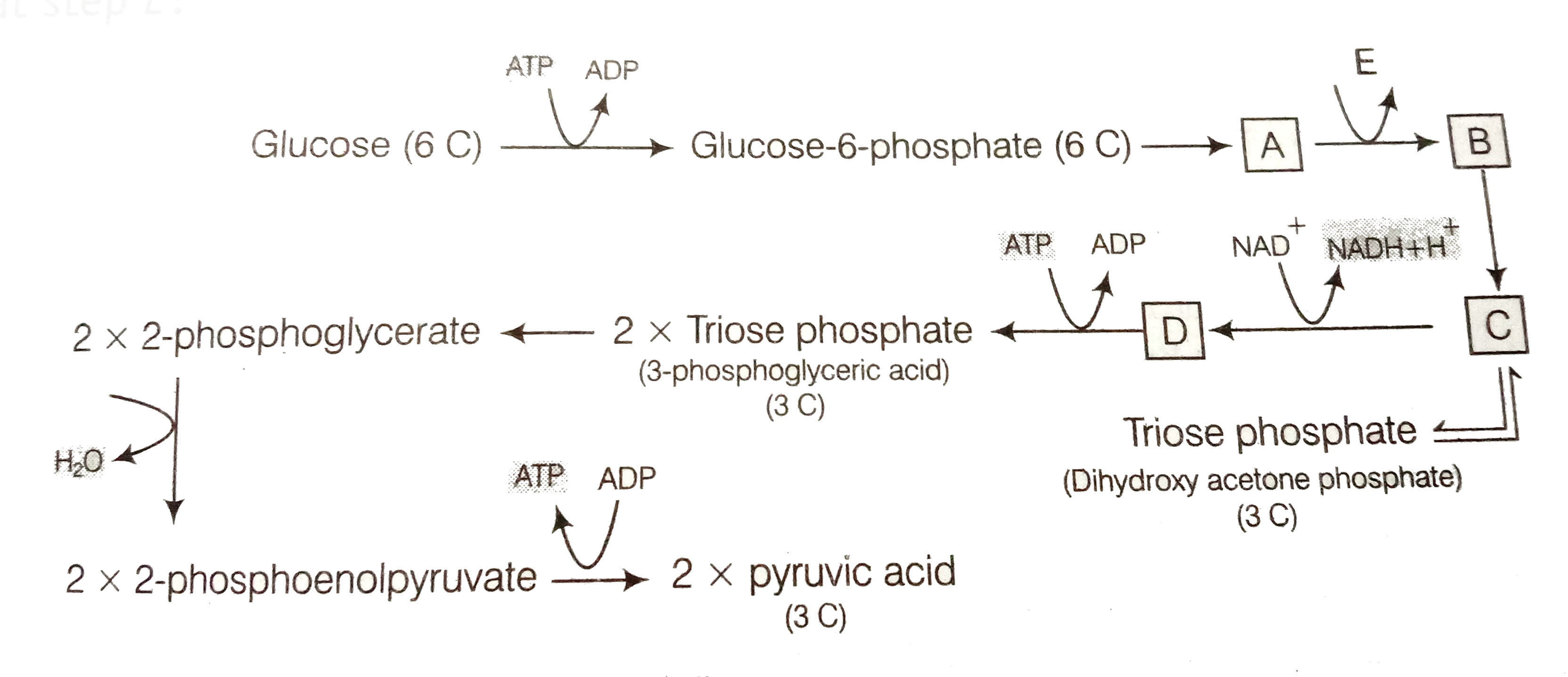Complete Solutions to SHORT ANSWER TYPE QUESTIONS of chapter RESPIRATION IN PLANTS of Class 11 book with complete answers and questions
| Class 11 | BIOLOGY |
| Chapter | RESPIRATION IN PLANTS |
| NCERT EXEMPLAR | SHORT ANSWER TYPE QUESTIONS |
| Number Of Questions | 23 |
| Academic Year | 2023-24 |
If a person is feeling dizzy, glucose or fruit juice is given immediately but not a cheese sandwich, which might have more energy. Explain.
View SolutionWhat is meant by the statement 'aerobic' respiration is more efficient?
View SolutionPyruvic acid is the end product of glycolysis. What are the three metabolic fates of pyruvic acid under aerobic and anaerobic conditions? Write in the space provided in the diagram.

View SolutionThe energy yield in terms of ATP is higher in aerobic respiration than during anaerobic respiration. Why is there anaerobic respiration even in organism that live in aerobic condition like human beings and angiosperms ?
View SolutionOxygen is an essential requirement for aerobic respiration but it enters he respiratory process at the end? Discuss.
View SolutionRespiration is an energy releasing adn enzymatically controlled catabolic process which involves a step-wise oxidative breakdown of organic process which involves a stet-wise oxidative breakdown of organic substances indside living . In this statament about respiration explain the meaing of
(a) Step-wise breakdown
(b) Organic substances (used as substrates).
View SolutionComment of the statement resiration is an energy producing process but ATP is being used in some steps of the process.
View SolutionThe figure given below shows the steps in glycolysis. Fill in the missing steps A,B,C,D and aslo indicate wheater ATP is being used up or released at step E?

View SolutionRespiratory pathway is
View SolutionWe commonly call ATP as the energy currency of the cell. Can you think of some other energy carries present in a cell ? Name any two.
View SolutionATP produced during glycolysis is a result of substrate level phosphorylation. Explain.
View SolutionDo you know any step in the TCA cycle where there is substrate level phosphorylation. Which one?
View SolutionIn a way green plants and cyanobacteria have synthesised all the food on the earth. Comment .
View SolutionWhen a substrate is being metabolised, why does not all the energy that is produced get released in one step. It is released in multiple steps. What is the advantage of step-wise release?
View SolutionRespiration requires `O_(2)`. How did the first cells on the earth magage to survive in an atmosphare that lacked `O_(2)`?
View SolutionIt is known that red muscle fibres in animals can work for longer periods of time continuously. How is this possible ?
View SolutionThe energy yield of ATP is higher in aerobic respiration than during anaerobic respiration. Explain.
View SolutionRuBP carboxylase, PEPcase, pyruvate dehydrogenase, ATPase, cytochrome oxidase, hexokinase, lactate dehydrogenase. Select/ choose enzymes from the list above which are involved in
(a) Photosyntheis (b) Respirattion.
Both in photosynthesis and respiration
View SolutionHow does a tree trunk exchange gases with the environment although it lacks stomata?
View SolutionWrite two energy yielding reactions of glycolysis.
View SolutionName the site (s) of pyruvate synthesis. Also write the chemical reaction wherein pyruvic acid dehydrogenase acts are a catalyst.
View SolutionResipratory pathway is believed to be a catabolic pathway. However, nature of TCA cycle is amphibolic. Explain.
View SolutionMention the important series of events of aerobic respiration that occur in the matrix of the mitochondrion as well as one that take place in inner membrane of the mitochondrion.
View Solution
SHORT ANSWER TYPE QUESTIONS questions and complete solutions for chapter RESPIRATION IN PLANTS of NCERT BIOLOGY (HINGLISH) of Class 11